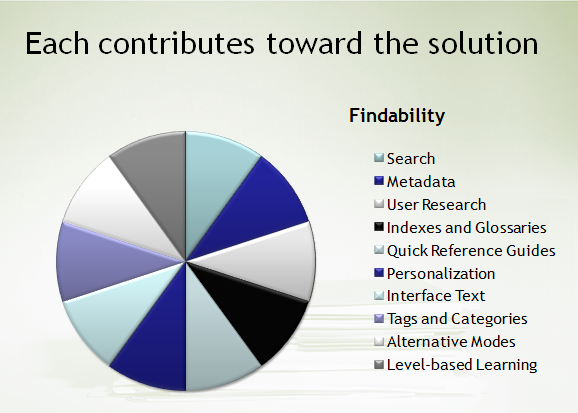My STC Webinar on Organizing Content -- This Thursday at 4pm EST
I'm giving an STC webinar this Thursday. Here's the description:
Organizing Help Content: Breaking Out of Topic-Based Hierarchies
Organizing help content so that users can both find and learn information often requires technical writers to break out of the traditional topic-based folders and move toward faceted navigation, search engine optimization, interface text, level-based help, and other methods for organizing content.
In theory, this is the same presentation I gave at the last STC Summit. In reality, it's a much different presentation. I've taken everything I learned from my Summit presentation, including feedback from attendees (which I received just last week, if you can believe it) and made this material much better.
The problem of my original presentation was one of ambition. I tried to tackle one of the most difficult challenges in help authoring: enabling users to find exactly what they're looking for quickly and easily in a mountain of possible help information. I set up the presentation as a solution, but noted its shortcomings and ultimate failure. That left a lot of people uneasy.
In my revised approach for the webinar, I take a different track. Rather than presenting a single solution, I present 10 approaches to findability that veer outside of a traditional table of contents. These alternative approaches include search, metadata, user research, indexes, quick reference guides, personalization, interface text, tags and categories, alternative modes (such as video), and level-based learning.
My new argument is that while no single method solves the findability problem in its entirety, each contributes toward an increase in findability. If you were to add all the solutions together, the net result would be a dramatic increase in findability.
What I don't address is how someone would find the time to implement all of these methods. In reality, you can spend more time trying to make your content findable than you do creating the content itself.
This new approach is more realistic. It isn't as appealing, because most of us like to think there's a simple answer to the problem, if we can just figure it out. But I doubt that's the case.
As a bonus for science enthusiasts, I also bookend the webinar with stories about Mendeleev (at the beginning) and Pythagoras (at the end). According to my evaluations, people like it when you bring in science.
If you're interested in the topic of findability, definitely check out my webinar. You can register here. 81 people are already registered, so there are only about 20 spots left (due to Genesys webinar limits).
For people who can't make the live webinar, I may make another recording of the content later, perhaps as a podcast.
About Tom Johnson

I'm an API technical writer based in the Seattle area. On this blog, I write about topics related to technical writing and communication — such as software documentation, API documentation, AI, information architecture, content strategy, writing processes, plain language, tech comm careers, and more. Check out my API documentation course if you're looking for more info about documenting APIs. Or see my posts on AI and AI course section for more on the latest in AI and tech comm.
If you're a technical writer and want to keep on top of the latest trends in the tech comm, be sure to subscribe to email updates below. You can also learn more about me or contact me. Finally, note that the opinions I express on my blog are my own points of view, not that of my employer.


